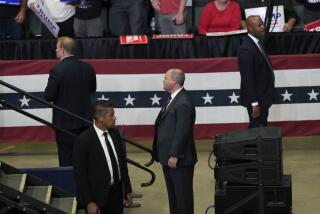High Court to Hear Hustler Appeal : Falwell Awarded $200,000 for Distress Caused by Parody
Can a magazine publisher be successfully sued for having published a parody of a public figure? No, most courts say.
Can the Rev. Jerry Falwell win a damage award in Virginia for a Hustler magazine parody that portrayed the fundamentalist minister as having had a drunken sexual encounter with his mother? Yes, a federal appeals court in Richmond said.
The two questions address the same issue, of course, and the Supreme Court agreed Monday to hear the magazine’s appeal of Falwell’s $200,000 damage award.
In 1984, a Virginia court rejected Falwell’s libel suit against Hustler because the fake ad in question was clearly labeled as a “parody--not to be taken seriously.” However, the jury still awarded damages, not for libel but for “intentional affliction of emotional distress.”
Review Sought
Press organizations urged the high court to review the ruling, fearing that it could be used to attack cartoonists and columnists who lampoon public figures, whether politicians or a public figure such as Falwell. In their appeals, they cited a powerful dissent written by four members of the U.S. 4th Circuit Court of Appeals.
“Political satire and parody aim to distress,” Judge J. Harvie Wilkinson III wrote. “If the electorate is to make informed choice, the political atmosphere will crackle with derision and approbation alike.”
The dissenters agreed that Hustler was “a singularly unappealing beneficiary of the First Amendment” and that its parody was an “offensive personal attack” on Falwell, whose church operation is based in Lynchburg, Va.
However, because Falwell is a nationally known religious and political leader, he should not “be able to recover damages for no other reason than hurt feelings” arising from a cartoon or parody, Wilkinson said.
Takeoff on Ads
The Hustler parody in question was a takeoff on ads for Campari liqueur, which feature interviews with celebrities on the “first time” they tasted the drink. Here, Falwell, who was pictured, says his “first time was in an outhouse outside of Lynchburg, Va.” In the comments that follow, he alludes to drunkenness and incest.
At the trial, Hustler Publisher Larry Flynt said that he intended to “assassinate” Falwell’s reputation and integrity, a comment noted by both federal courts in upholding the verdict. The case of Hustler vs. Falwell, 86-1278, will be heard during the high court’s next term that begins in October.
In other action, the court:
--Let stand the convictions of two religious workers who aided Salvadorans illegally entering the United States. Two lower courts said that the workers’ religious beliefs did not give them an exemption to violate federal immigration laws. This was the first high court test for the sanctuary movement, but the justices refused to consider the appeal (Merkt vs. United States, 86-1089).
--Refused to force the Department of Transportation to require air bags in new cars immediately, a move that department critics say could save thousands of lives on the highways. The department has required car makers by 1990 to add some form of “passive restraint” --air bags or automatic seat belts. New York attorneys appealed this regulation, saying that it did not go far enough for driver safety (New York vs. Dole, 86-999).
--Heard arguments in a case that tests whether Rotary International can expel its Duarte, Calif., chapter for having admitted women. The justices appeared skeptical of the international’s claim that it had a “constitutional right” to insist on all-male chapters, even if this violates state law. A California court ruled that the local clubs are “business organizations” and therefore cannot discriminate against women (Rotary International vs. Rotary Club of Duarte, 86-421).
--Heard arguments in a test of California’s beach-access program, in which an attorney representing a Ventura couple said the owners’ private beach was like a “big sandbox in the backyard” where their children could play safely. But an attorney for the state said that permitting the public to walk along the beach is a “very reasonable requirement” in exchange for a permit to build a two-story home (Nollans vs. California Coastal Commission, 86-133).
More to Read
Sign up for Essential California
The most important California stories and recommendations in your inbox every morning.
You may occasionally receive promotional content from the Los Angeles Times.







